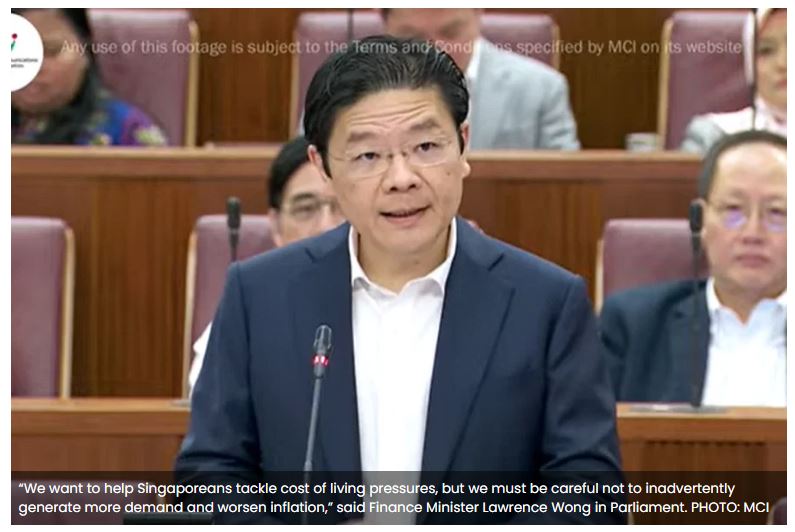Singapore has no ‘fiscal slack’ but must be careful with corporate tax moves: Lawrence Wong
SINGAPORE has a tight fiscal position over the medium-term, said Finance Minister Lawrence Wong, as he noted the limitations of alternative revenue sources — particularly corporate taxes — that Members of Parliament (MPs) had raised earlier in the Budget debate.
Budget 2023 is a “delicate balancing act”, said Wong in his round-up speech on Friday (Feb 24). The government wants a more sustainable fiscal position but cannot taper down support too quickly due to the uncertain economic outlook. And while helping Singaporeans tackle the cost of living, “we must be careful not to inadvertently generate more demand and worsen inflation”.
Contrary to what Progress Singapore Party (PSP) Non-Constituency MP (NCMP) Leong Mun Wai suggested, the government does not have “fiscal slack”, said Wong.
He cited a Ministry of Finance paper which projected that public spending would hit 20 per cent of gross domestic product by 2030 – and that without tax moves in recent budgets, including the goods and services tax (GST) hike, revenue would be insufficient.
Noting that this does not take into account increased spending from new policies, Wong said: “The bottom line is that our tight fiscal position is very much a reality over the medium term.”
In the earlier two days of debate, MPs suggested various alternative sources of revenue, including corporate and wealth taxes, in lieu of hiking the broad-based GST.
To the first, Wong replied that Singapore must “be very careful” in raising corporate taxes, not least given global tax changes.
Singapore is set to implement a domestic top-up tax to achieve the minimum effective tax rate under Pillar Two of the Base Erosion Profit Shifting (BEPS 2.0) initiative. This could mean more tax revenue – assuming that affected multinational enterprises (MNEs) do not leave, which is “a big assumption”.
Many major economies are offering vast subsidies and introducing schemes to strengthen their competitive advantage in response to BEPS 2.0, said Wong. MNEs themselves “are already making clear” to Singapore that their home countries are offering incentives and other countries in the region have cheaper land, labour and electricity.
Said Wong: “We cannot afford to price ourselves out of the competition, or else Singapore and Singaporeans will end up the biggest loser.”
Net wealth taxes, meanwhile, have not been very effective elsewhere and have often been removed, said Wong. He added that what Switzerland collects from its net wealth tax is comparable to what Singapore already collects from its own form of wealth taxes: property taxes and stamp duties.
As for PSP NCMP Hazel Poa’s suggestion to treat land sales proceeds as revenue over the duration of the lease, Wong replied that this “is not likely to generate more revenue than what we already get today from land sales over a period of time”.
This is because the financial proceeds of land sales go into past reserves and are invested. The net investment returns contribution enables the government to spend more than if the proceeds were treated as revenue, he added.
Ultimately, it is “not a matter of choosing between GST and any of these alternatives”, said Wong: “We will need all of that, and a mix of taxes on income, consumption and assets, to provide sound and stable public finances in Singapore.”
Besides a diversified revenue base, Singapore has progressive redistribution, said Wong. Those in the top fifth receive about S$0.30 in benefits for every dollar they pay in taxes, while the bottom 20 per cent receive S$4 for every dollar.
As for the middle-income, the government remains “very focused” on ensuring that their real incomes keep growing. Median household real income growth in Singapore over the past decade was more than 3 per cent per annum, higher than the United States and most European societies, as well as other Asian societies like Japan and Hong Kong.
Separately, Wong addressed MPs’ concerns over changes to the Working Mothers Child Relief (WMCR). The WMCR was introduced to encourage higher-income married women to have children, but experience suggests that such couples typically base parenthood decisions on other factors, he said. With fertility declining across the board, the government has decided to change the support to focus on those with greater needs.
Furthermore, the changes should not be seen in isolation, but part of a package of marriage and parenthood measures — including enhancements to the Baby Bonus scheme, as well as increased paternity leave, he added.
Source: https://www.businesstimes.com.sg/singapore/singapore-has-no-fiscal-slack-must-be-careful-corporate-tax-moves-lawrence-wong


 English
English




